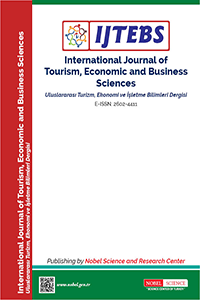Abstract
Corporate Social Responsibility (CSR) concept has attracted considerable interest in recent years by researchers and practitioners. Due to an increased awareness of the need for CSR this study examines corporate social responsibility perceptions of maritime faculty students (MFS). MFS were chosen for this research since these students are usually employed by an international organization and have diffuculties in interpreting ethical issues in a business context because of cultural differences. Owing to the multicultural nature of shipboard work, it is important for every seafarer to be ethically sensitive toward shared values and virtues worldwide. Self-reported data was collected through a structured questionnaire from 120 undergraduates in Maritime Faculty of Kocaeli University. Students consider that “legal responsibilities” as the most important CSR component, followed by the“economic responsibilities”, “ethical responsibilities” and “philanthropic responsibilities”. Furthermore, findings show that women gave higher priority than men to two components of CSR including “legal responsibilities” and “philanthropic responsibilities”.
Keywords
Corporate social responsibility economic responsibilities legal responsibilities ethical responsibilities
References
- Abe, M., & Ruanglikhitku, W. (2013). Convergence and Coherence in International CSR Instruments: Implications for business in the Asian and Pacific Region. In R. Ratnayake (Ed.), From corporate social responsibility to corporate sustainability: Moving the agenda forward in Asia and the Pacific (pp.1–102). New York: United Nations.
- Carroll, A. B., and Buchholtz, A. K. (2008). Business and Society, International student edition.
- Clarkson, M. (1995). A Stakeholder Framework for Analyzing and Evaluating Corporate Social Performance, The Academy of Management Review 20 (1), 92–117.
- Elias, Z. R. (2004). An examination of Business Students Perception of Corporate Social Responsibilities Before and After Bankruptcies, Journal of Business Ethics, 52, 267- 281.
- Freeman, R. (1984). Strategic Management: A Stakeholder’s Approach, Pitman, Boston, MA.
- Friedman, M. (1970, September 13). The Social Responsibility of Business is to Increase its Profits. New York Times Magazine, 122-126.
- Hatch Butler and Stephen K. Sheryl-Ann (2015 ). Gender Effects on Perceptions of Individual and Corporate Social Responsibility, Journal of Applied Business and Economics Vol. 17(3), 63-71.
- Haag Fredrik, Kleverlaan Edward and Dispert Astrid, Estimations of the contribution of international shipping to greenhouse gas emissions, International Maritime Organization, Brief for GSDR2015.
- Jeffrey, C. (1993). Ethical Development of Accounting Students, Non-Accounting Business Students, and Liberal Arts Students. Issues in Accounting Education 8 (1), 86-96.
- Joyner, B.E., Payne, D. (2002). Evolution and Implementation: A Study of Values, Business Ethics and Corporate Social Responsibility. Journal of Business Ethics, 41 (4), 297–311.
- Kraft, K. L. (1991). The Relative Importance of Social Responsibility in Determining Organizational Effectiveness: Student Responses, Journal of Business Ethics 10, 179-188.
- Lindeman M, Verkasalo M. (2005). Measuring Values With the Short Schwartz’s Value Survey. Journal Personal Assessment, 85(2): 170-178.
- Marquis, C. and M. Lee. (2013). Who is Governing Whom? Executives, Governance, and the Structure of Generosity in Large US Firms, Strategic Management Journal 34, 483-497.
- Peterson RA, Albaum G, Merunka D, Munuera TL, Smith SM (2010). Effects of Nationality, Gender and Religiosity on Business Related Ethical. J. Bus. Ethics, 96, 573-587.
- Ramasamy, B. and Yeung, M. (2009). Chinese consumers’ perception of corporate social responsibility (CSR), Journal of Business Ethics, Vol. 88, No. 1, 119-132.
- Seifert, B., Morris, S. A., & Bartkus, B. R. (2004). Having, giving, and getting: Slack resources, corporate philanthropy, and financial performance, Business & Society, 43, 135–161.
Abstract
References
- Abe, M., & Ruanglikhitku, W. (2013). Convergence and Coherence in International CSR Instruments: Implications for business in the Asian and Pacific Region. In R. Ratnayake (Ed.), From corporate social responsibility to corporate sustainability: Moving the agenda forward in Asia and the Pacific (pp.1–102). New York: United Nations.
- Carroll, A. B., and Buchholtz, A. K. (2008). Business and Society, International student edition.
- Clarkson, M. (1995). A Stakeholder Framework for Analyzing and Evaluating Corporate Social Performance, The Academy of Management Review 20 (1), 92–117.
- Elias, Z. R. (2004). An examination of Business Students Perception of Corporate Social Responsibilities Before and After Bankruptcies, Journal of Business Ethics, 52, 267- 281.
- Freeman, R. (1984). Strategic Management: A Stakeholder’s Approach, Pitman, Boston, MA.
- Friedman, M. (1970, September 13). The Social Responsibility of Business is to Increase its Profits. New York Times Magazine, 122-126.
- Hatch Butler and Stephen K. Sheryl-Ann (2015 ). Gender Effects on Perceptions of Individual and Corporate Social Responsibility, Journal of Applied Business and Economics Vol. 17(3), 63-71.
- Haag Fredrik, Kleverlaan Edward and Dispert Astrid, Estimations of the contribution of international shipping to greenhouse gas emissions, International Maritime Organization, Brief for GSDR2015.
- Jeffrey, C. (1993). Ethical Development of Accounting Students, Non-Accounting Business Students, and Liberal Arts Students. Issues in Accounting Education 8 (1), 86-96.
- Joyner, B.E., Payne, D. (2002). Evolution and Implementation: A Study of Values, Business Ethics and Corporate Social Responsibility. Journal of Business Ethics, 41 (4), 297–311.
- Kraft, K. L. (1991). The Relative Importance of Social Responsibility in Determining Organizational Effectiveness: Student Responses, Journal of Business Ethics 10, 179-188.
- Lindeman M, Verkasalo M. (2005). Measuring Values With the Short Schwartz’s Value Survey. Journal Personal Assessment, 85(2): 170-178.
- Marquis, C. and M. Lee. (2013). Who is Governing Whom? Executives, Governance, and the Structure of Generosity in Large US Firms, Strategic Management Journal 34, 483-497.
- Peterson RA, Albaum G, Merunka D, Munuera TL, Smith SM (2010). Effects of Nationality, Gender and Religiosity on Business Related Ethical. J. Bus. Ethics, 96, 573-587.
- Ramasamy, B. and Yeung, M. (2009). Chinese consumers’ perception of corporate social responsibility (CSR), Journal of Business Ethics, Vol. 88, No. 1, 119-132.
- Seifert, B., Morris, S. A., & Bartkus, B. R. (2004). Having, giving, and getting: Slack resources, corporate philanthropy, and financial performance, Business & Society, 43, 135–161.
Details
| Journal Section | Articles |
|---|---|
| Authors | |
| Publication Date | December 30, 2017 |
| Published in Issue | Year 2017 Volume: 1 Issue: 1 |


